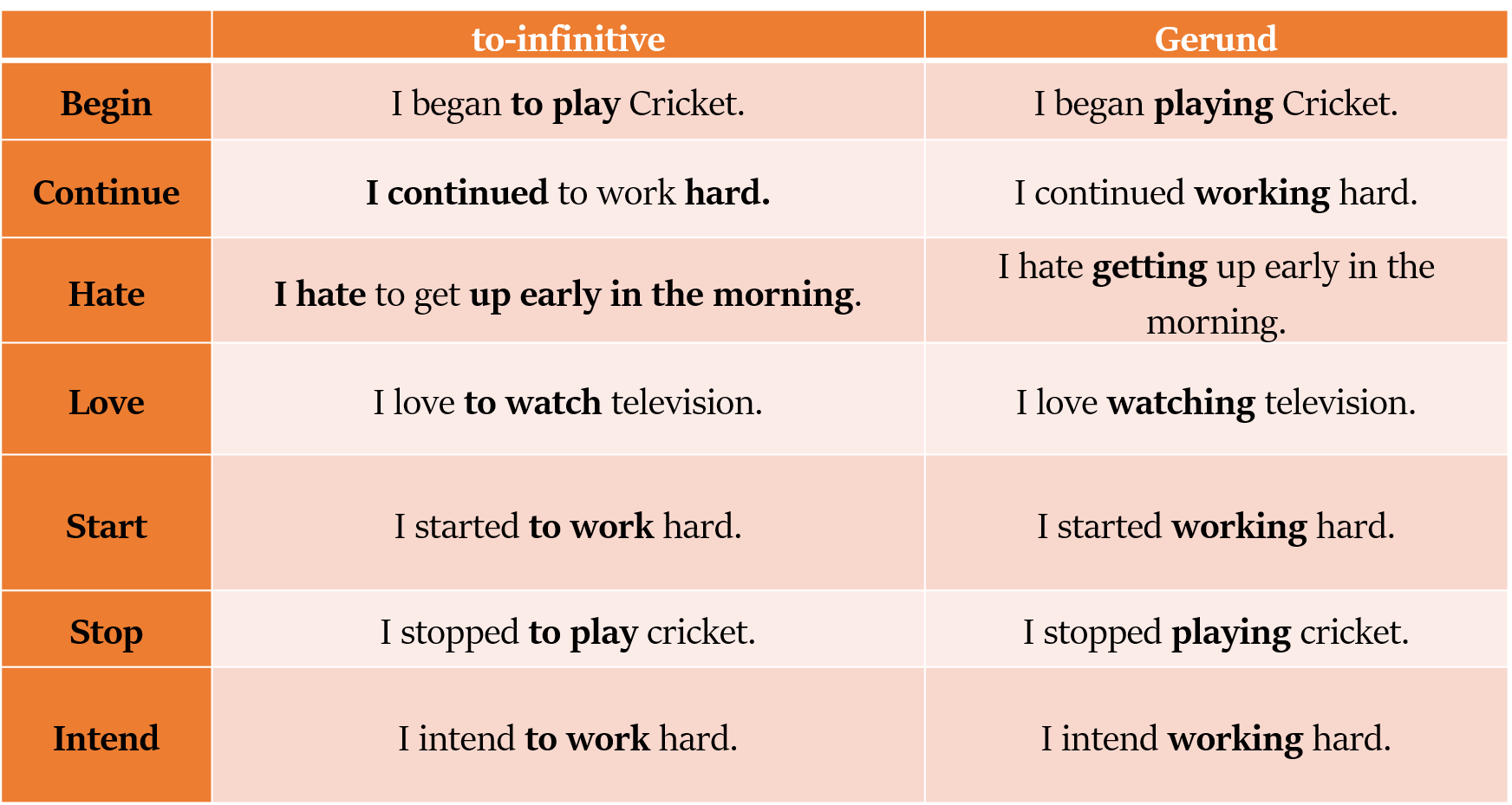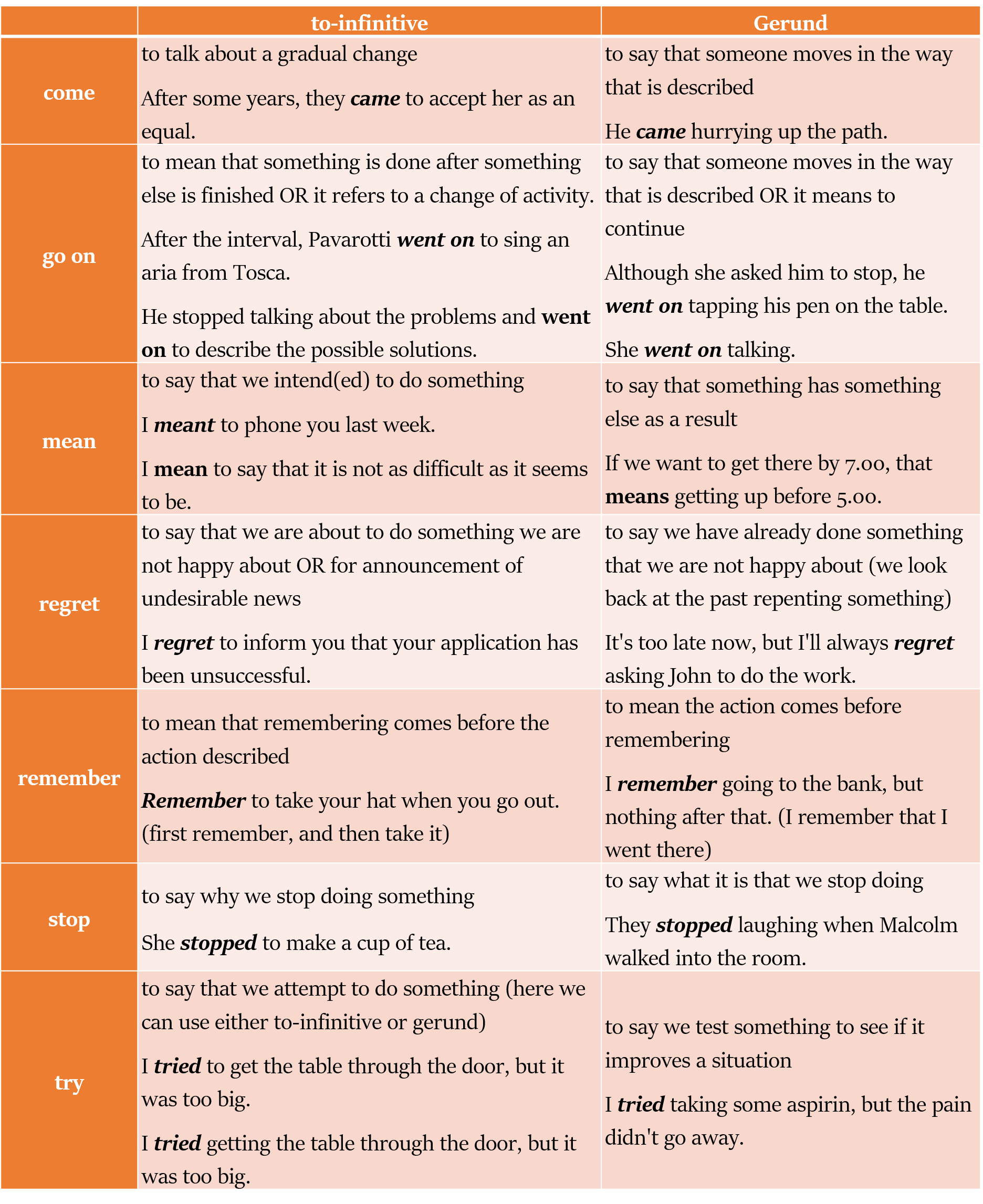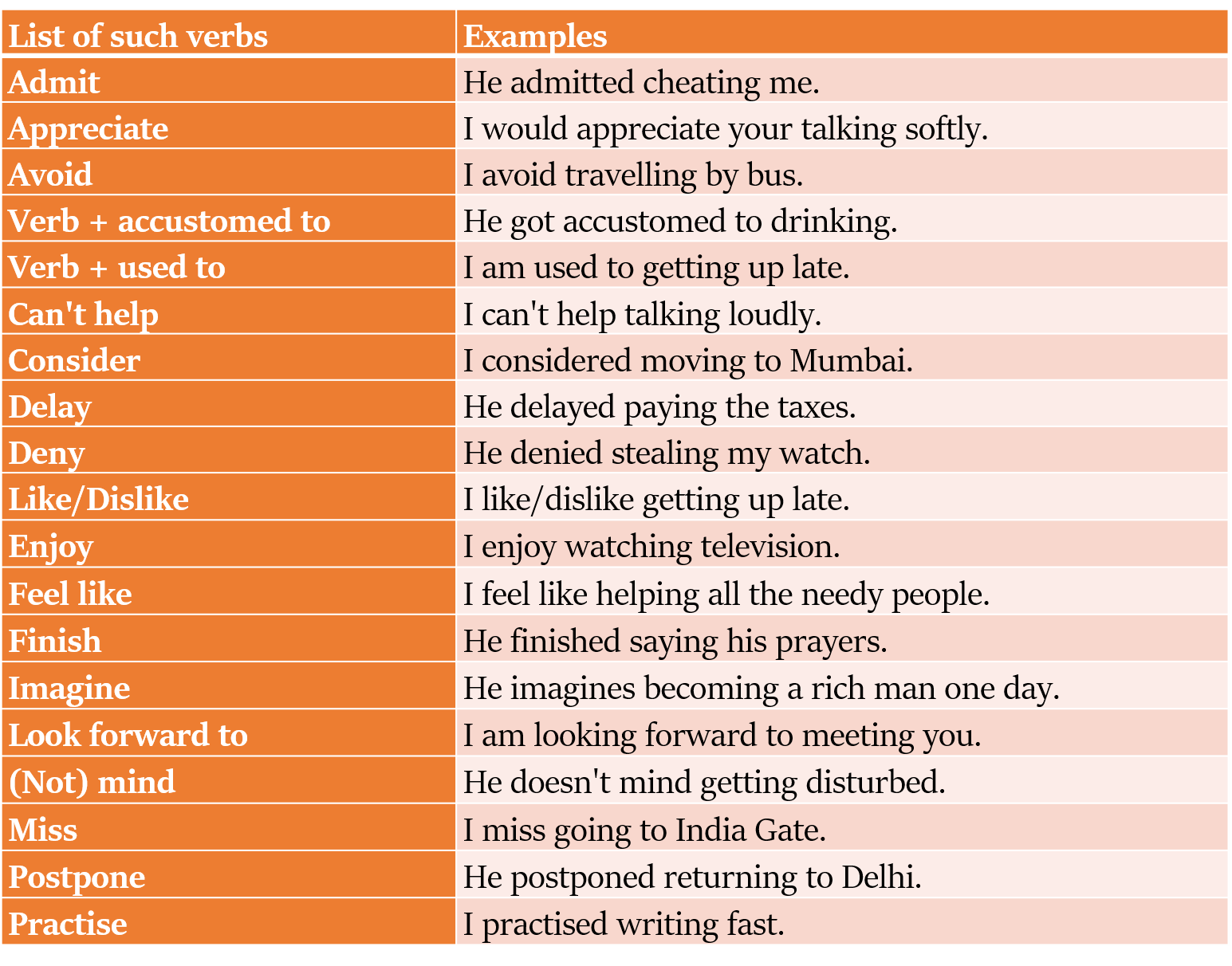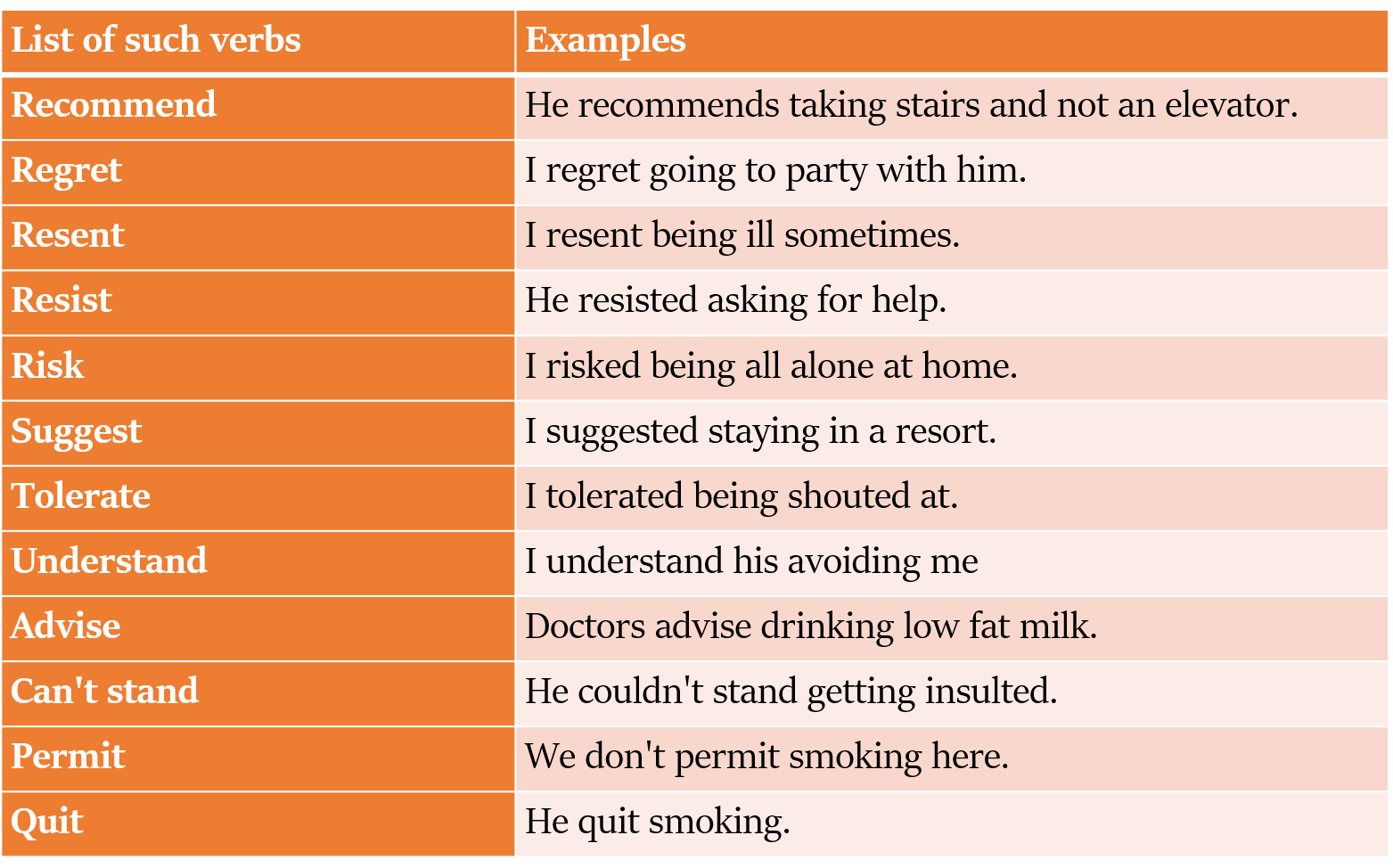Functions of Gerund
Objective or Possessive case before Gerund
We can use either the possessive case or objective case of nouns and pronouns before gerunds. The possessive form is more formal.
There is no possibility of me coming late. (correct; me – objective case)
There is no possibility of my coming late. (correct: my – possessive case)
I resented Anand winning the competition. (correct; Anand – objective case)
I resented Anand’s winning the competition. (correct: Anand’s – possessive case)
Saurabh recalled him borrowing the bike. (correct; him – objective case)
Saurabh recalled his borrowing the bike. (correct: his – possessive case)
Some other verbs that can be followed by an object with a possessive case and then a gerund (-ing form) include:
- verbs of ‘(dis)liking’ such as: detest, disapprove of, dislike, hate, like, love, object to, and
- verbs of ‘thinking’ such as: envisage, forget, imagine, remember, think of.
We can only use a possessive form (my, Anand’s, his) like this to talk about a person or a group of people:
I remembered the horse’s winning the race. (incorrect)
I remembered the horse winning the race. (correct)
Infinitive Vs. Gerund
Concept 1
Both the Gerund and the Infinitive can work as a Noun and a Verb. So, they have many similar uses and are interchangeable in many sentences, i.e. we can use either of them without any special difference in meaning.
Teach me to bowl.
Teach me bowling.
To give is better than to receive.
Giving is better than receiving.
Concept 2
Some verbs are followed by gerunds, some verbs are followed by infinitives, and some verbs can be followed by either gerunds or infinitives.
We will need to learn in detail which verb is followed by what. But before we do so, let’s get to know some tips that will make our task easier.
Tip 1
In most cases a gerund will come after a preposition. An infinitive cannot be the object of a preposition, only a gerund can.
He is afraid of to box. (incorrect; of – preposition; to box - infinitive)
He is afraid of boxing. (correct; of – preposition; boxing - gerund)
He is afraid to box. (correct; to box – infinitive; here we dropped the preposition)
Tip 2
To talk about an activity, we generally use a gerund.
He stopped drinking.
To describe many activities we use the following pattern.
Pattern: go + gerund
Let’s go skiing.
We went shopping.
Concept 3: Verbs followed by either Gerund or Infinitive
Some verbs can be followed by either Gerund or Infinitive. But the meaning of the sentence may or may not differ in the two cases.
Type 1: Meaning of the sentence will remain the same
Some verbs can be followed by either Gerund or Infinitive. The meaning of the sentence will remain the same.

Some other such verbs are: like, neglect, prefer, propose, remember
However, with these verbs we normally avoid using two -ing forms together, as a repeated pattern can sound awkward.
I’m starting learning Gujrati. (incorrect)
I’m starting to learn Gujrati. (correct)
begin and start
They can be followed by Gerund or to-infinitive form with no difference in meaning.
I began to play Mario.
I began playing Mario.
She started to look for a new job.
She started looking for a new job.
like, love, hate and prefer
They can be followed by Gerund or to-infinitive form with no difference in meaning.
I love to take a nap in the afternoon.
I love taking a nap in the afternoon.
Children enjoy to watch cartoons.
Children enjoy watching cartoons.
Exception:
But after would + like / prefer / love / hate, infinitives are preferred.
I would like to meet the chef.
I would love to drive for you.
sorry
Sorry for/about + gerund – Refers to past things that one regrets.
I am sorry for keeping your application pending for such a long time.
Sorry + perfect infinitive (more formal) can be used with the same meaning.
I’m sorry to have kept you waiting.
advise and encourage
These verbs are followed by gerund when there is no object and to-infinitive when there is one.
I’d advise doing more exercise. (correct)
I’d advise you to do more exercise. (correct; you - object)
remember, regret, forget
If Remember / Regret / Forget denote the first action then the second action will be denoted by to-infinitive.
On the other hand, if Remember / Regret / Forget denote the second action then the first action will be denoted by a Gerund.
Remember / Regret / Forget (First action) + [To +
Remember/ Regret / Forget (Second action) + [
I remember (second action) to meet (first action) you a few years ago. (incorrect)
I remember (second action) meeting (first action) you a few years ago. (correct)
I regret (second action) reprimanding (first action) your children last night. (correct)
Type 2: Meaning of the sentence may change
Some other verbs can be followed by either a to-infinitive or a gerund, but the meaning of the sentence may change.

Verbs of perception
With many verbs of perception (e.g. feel, hear, notice, observe, overhear, see, watch, etc.) too, we can use either a to-infinitive or a gerund, but the meaning of the sentence may change.
In fact, there are two ways in which the meaning of a sentence may change, when verbs of perception are involved.
Change 1: Action happened Once or Repeated
When these verbs are followed by a bare infinitive, it suggests that the action happened only once.
I noticed him throw a wrapper on the floor. (throw – bare infinitive)
When these verbs are followed by a gerund, it suggests that the action was repeated or happened over a period of time.
I heard those dogs barking most of the night. (barking – gerund)
Change 2: Action observed Completely or Partially
When these verbs are followed by a bare infinitive, it suggests that we watched, heard, etc. the whole action from its start to its finish (‘complete events or actions’ which are seen or heard from beginning to end).
I watched him climb through the window. (climb – bare infinitive)
I saw the old man cross the road and disappear in the moor. (cross - bare infinitive)
When these verbs are followed by a gerund, it suggests that we watched, heard, etc. some of the action, but not from start to finish (i.e. one pays attention to ‘events’ or ‘actions’ that are already going on).
I was able to watch them building the new car park from my office window. (building – gerund)
I saw the old man crossing the road. (crossing – gerund)
Concept 4: Verbs followed by Gerund and not infinitive


Verb phrases and Adjective phrases followed by Gerund and not Infinitive
Concept 1
We mostly use gerunds after prepositions (with some exceptions). Prepositions can come after any word - a noun, a pronoun, a verb or an adjective.
A preposition that follows a noun:
Stories about growing up are popular among youngsters. (about - preposition)
We have an interest in becoming members of this club. (in - preposition)
A preposition that follows a pronoun:
You will be punished for not telling the truth. (for - preposition)
I talked him out of taking that cab. (of - preposition)
Exception:
‘but’ can work as a conjunction or a preposition. When ‘but’ works as a preposition, it means ‘except’.
If ‘but’ or ‘except’ are used like this, we use an infinitive after them (and not a gerund).
I had no choice but to help them. (but - preposition)
Mark made no attempts to woo her back except to call her once. (except - preposition)
Concept 2
Some verb and adjective phrases are also followed by a Gerund.
At last we succeeded in accomplishing this mission.
Are you interested in reading Gita?
go and go out
Pattern 1: go + Gerund
Pattern 2: go out (for) + Gerund
Gerund → should be recreational/sports related, e.g. riding, hunting, swimming, skating, skiing, climbing, sailing, fishing, shopping, hitch-hiking
Whenever these words will come after ‘go’, then they will come in “ing” form (i.e. as Gerund), without preposition.
I have decided to go for hitch-hiking tomorrow. (incorrect)
I have decided to go hitch-hiking tomorrow. (correct)
Let’s go for shopping tonight. (incorrect)
Let’s go shopping tonight. (correct)
Expressions followed by Gerund and not Infinitive
Concept 1
No good / No worth / No use + Gerund
It is no use to cry over spilt milk. (incorrect)
It is no use crying over spilt milk. (correct)
Busy + No preposition + Gerund
Are you busy in helping your father? (incorrect; drop the preposition ‘in’)
Are you busy helping your father? (correct)
Can’t help + Gerund = Can’t help but +
We can’t help smiling and laughing in the classroom. (correct) OR
We can’t help but smile and laugh in the classroom. (correct)
Concept 2
There + is / was + no harm / no sense / no point + (in) + [Gerund / to + V1]
There is no point to talk to your parents. (incorrect)
There is no point (in) talking to your parents. (correct)
Is there any harm to learn Japanese? (incorrect)
Is there any harm in learning Japanese? (correct)
Concept 3
can’t help, can’t stand, be worth, it’s no use, there’s no point, in spite of + Gerund
He couldn’t help teasing his sister.
I can’t stand being mocked by my collegues.
It might be worth exploring the basement.
It’s no use trying to catch them.
There’s no point in playing.
In spite of missing the bus, we arrived on time.
Concept 4
Subject + waste/spend + expressions relating time/money + [Gerund / to + V1]
Aanya spends too much time to watch television. (incorrect)
Aanya spends too much time watching television. (correct)
Meenakshi has spent years to try to persuade Monica. (incorrect)
Meenakshi has spent years trying to persuade Monica. (correct)
Concept 6: Verbs followed by Infinitive and not Gerund
Concept 1
Some verbs are followed by a to-infinitive but not a gerund. Sometimes, they take a noun/pronoun (direct object) before the to-infinitive.
Pattern 1: Verb + to-infinitive
Such verbs are: afford, agree, appear, arrange, ask, begin, care, continue, decide, demand, expect, fail, forget, hesitate, hope, learn, manage, mean, offer, plan, prepare, pretend, promise, refuse, remember, seem, stop, volunteer, wait, want, wish
We offered to pay for the dinner.
He promised to return.
Pattern 2: Verb + Noun/Pronoun (direct object) + to-infinitive
Such verbs are: advise, allow, ask, cause, challenge, command, convince, encourage, expect, forbid, force, hire, instruct, intend, invite, order, pay, permit, persuade, program, remind, teach, tell, urge, want, warn
Also, would like/love, would prefer
He encouraged his juniors to revolt against the management. (his juniors - pronoun)
Remind me to give Mragank a call. (me - pronoun)
Concept 2
Apart from some verbs, infinitives are also used after many adjectives. When we describe something with an adjective we should use an infinitive (rather than a gerund).
It is not easy to play for Bayern Munich. (easy - adjective)
It is necessary to speak in a humble tone with customers. (necessary - adjective)
If we want to convert object of to-infinitive into a subject, we should use a gerund:
Playing for Bayern Munich is not easy.
Speaking in a humble tone with customers is necessary.

Extra Books and Tools
If you prefer to learn via books, or want some good English Grammar books for reference purposes, you may read this article which enlists some of the books recommended by us.